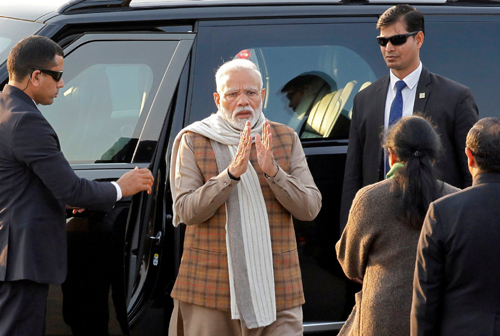Major Power Relations
Your Present Location: PROGRAMS> Major Power RelationsLin Minwang: Indian govt trying to find a winning position for election
Source: China Daily Published: 2019-2-14

India's Prime Minister Narendra Modi arrives to attend the Beating the Retreat ceremony in New Delhi, India, Jan 29, 2019. [Photo/Agencies]
Editor's note: The Indian Ministry of External Affairs has said the cancellation of some Belt and Road projects in Pakistan and Nepal is testimony to some unacceptable conditions of the initiative proposed by China. In his interview with Guancha.cn, Lin Minwang, a researcher in South Asia studies at the Shanghai-based Fudan University, comments:
That President Xi Jinping met with Indian Prime Minister Narendra Modi four times last year indicates relations with India are not as bad as some people think.
The Modi government is adjusting its foreign policies this year as it intends to keep a stable external environment so as to avoid possible diplomatic skirmishes from escalating into big issues ahead of this year's election. Thus, it is showing more tolerance toward its neighbors, including China, than before.
But that is different from being intent on mending the lack of mutual trust with Beijing, which has remained the main obstacle hindering the world's two largest developing countries from improving their relations.
New Delhi has remained suspicious about the Belt and Road Initiative, which is not difficult to understand, since many projects in South Asia are located in India's neighbors, New Delhi's backyard, some in Pakistan, its regional foe, and some in a disputed region.
Geopolitics is something the initiative cannot steer clear of. China is well prepared for such predictable resistance and remains attentive to India's concerns. Although India does not participate in such multi-party projects as China-India-Nepal and Bangladesh-China-India-Myanmar economic corridors, relevant projects have unfolded as planned without its endorsement because of local people's practical needs, which India fully understands as well.
China is now moving from being a regional power to a global power. Its influence has begun to extend beyond East Asia. However, India is obviously still a regional power. India needs the United States to help counterweigh China's rising influence in the region, and vice versa. In return the US pays due respect to India's overlord status in the Indian Ocean, where in fact Washington has much stronger political, economic and military influence than New Delhi.
However, the door remains open for India to participate in the Belt and Road Initiative.
Lin Minwang is a visiting fellow of Chongyang Institute for Financial Studies, Renmin University of China.























































































 京公网安备 11010802037854号
京公网安备 11010802037854号





